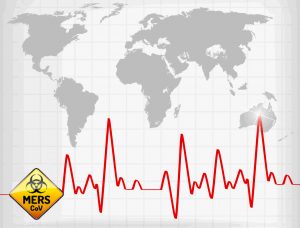If you are intending to travel to South Korea or the Arabian Peninsula it is wise to be aware of a new disease called Middle East Respiratory Syndrome (MERS).
MERS is a viral respiratory disease caused by a novel coronavirus (MERS-CoV) that was first identified in Saudi Arabia in 2012.
Most people who have been confirmed to have MERS-CoV infection developed rapid onset of severe respiratory disease. Most severe cases have occurred in people with underlying conditions that may make them more likely to get respiratory infections.
All cases have lived in or travelled to the Middle East, or have had close contact with people who acquired the infection in the Middle East. MERS-CoV has occurred in those who have travelled or lived in:
- Jordan
- the Kingdom of Saudi Arabia
- Qatar
- Kuwait
- Oman
- the United Arab Emirates
- Yemen
- Iraq
- Lebanon
Imported cases, and/or cases in the hospital room, family and other close contacts of people who have been in the countries listed above have occurred in:
- South Korea
- Italy
- the United Kingdom
- France
- Tunisia
- Malaysia
- Germany
- Greece
- Iran
- the Philippines
- Egypt
- Algeria
- the Netherlands
- the United States.
There have been no cases in Singapore.
What are the symptoms?
- Severe confirmed cases have had a rapid onset of serious respiratory illness, especially pneumonia.
- Symptoms include fever, cough, shortness of breath and breathing difficulties.
- There have also been cases with mild influenza-like symptoms or without any symptoms, but these are people who have been in contact with other seriously ill cases (secondary cases).
- A variety or other symptoms have been reported in some cases including muscle pain, diarrhoea, vomiting and nausea.
How is it spread?
Dromedary camels are suspected to be the source of infection for sporadic cases, but the exact routes of direct or indirect exposure remain unknown. Person-to-person transmission has been documented, particularly in healthcare settings. The virus is likely to have originated in bats, but that doesn’t mean that it spread directly to people from bats.
Who is at risk?
People who are living in or travelling to affected areas of the Middle East or who have had contact with other cases may be at risk of catching the disease. People with underlying illnesses that make them more vulnerable to respiratory disease may be at a higher risk.
What should I do if I am travelling in the Middle East and feel unwell?
If you become ill or feel unwell while travelling in the Middle East, you should not wait until you arrive back in Singapore to seek medical assistance. Instead you should see a doctor or go to the local emergency department to work out why you are ill.
What should I do if I return from travel in the Middle East and feel unwell?
If you return from travel to the Middle East and feel unwell within 14 days you should see your doctor or go to the emergency department to work out why you are ill. You should mention when calling ahead you have been in the Middle East, or mention if you know you have been in contact with someone who you know had MERS-CoV.
While sick, stay home from work or school and delay future travel to reduce the possibility of spreading the illness to others.

There is no vaccine to prevent MERS-CoV disease.
The World Health Organisation advises that people at potentially higher risk of severe disease due to MERS-CoV should take appropriate precautions when visiting farms, barn areas or market environments where camels are present in MERS-affected countries. Appropriate precautions might include avoiding contact with camels, good hand hygiene, and avoiding drinking raw milk or eating food that may be contaminated with animal secretions or products unless they are properly washed, peeled, or cooked.
All travellers should adhere to general hygiene measures, such as regular hand washing before and after touching animals, avoiding contact with sick animals, and following food hygiene practices when visiting a farm or barn in MER-CoV affected countries.
How is it diagnosed?
MERS coronavirus disease is diagnosed by finding genetic material from the virus in respiratory samples such as fluid from the lungs. Suspected cases are referred to a specialist infectious diseases unit for further investigation.
How is it treated?
There is currently no specific treatment for people who are sick with MERS-CoV but general supportive medical care can be life-saving.
What is the public health response?
The World Health Organization is working with affected countries to minimise the risk of spread and find out more about the disease.
There have been no cases in Singapore, but special procedures to prevent the spread of MERS-CoV would be put in place in the event of a suspected case. These would include:
- Asking the person to wear a surgical mask.
- Laboratory and healthcare workers seeing patients or handling specimens would follow special safety guidelines.
- Public Health authorities would follow-up any case to ensure that the disease does not spread.
- Doctors and laboratories would inform the Ministry of Health of suspected cases.
- Close contacts of people diagnosed or suspected of having MERS-CoV will be followed up and given information about the risk of infection, and would be tested for the disease if necessary.
MOH UPDATE ON MERS (June 2015)
WHO UPDATE: Current Situation in South Korea and China (05/June/2015)

MBBS (Wales, UK), MRCGP (UK)
































